The surgeon usually takes responsibility for whatever happens inside the operating room. Should a multilateral organization do the same when one of its member countries does not reach the goals agreed upon as part of a major loan program?
The International Monetary Fund has now failed twice to bring durable reforms to Argentina. Experts say the disappointing result could damage the IMF's reputation.
"They have to worry about their reputation because this is the second time they made a mess of Argentina and everybody knows it in the world," said Mark Weisbrot, co-director of the Center for Economic and Policy Research. "The IMF is going to continue to loose influence in the world. That has been the trend for 20 years now."
President Mauricio Macri's decision to get financing from the IMF brought bad memories to many Argentines, who blame the Fund for the financial crisis in 2001 that left millions of people unemployed and sent the poverty rate above 50%.
That year the South American country entered a historical default for $100 billion and it was able to return to the financial markets 15 years later only after a laborious legal fight with creditors.
Macri last year got a $57 billion loan, the largest in IMF's history, as part of a strict program to cut public spending.
"The problem is the IMF responses are always politically disastrous and make it impossible for any reformer to survive," said Benjamin Gedan, director of the Wilson Center's Argentina Project.
Both experts say a fundamental mistake by the IMF was to push for too-strict cuts even when the Argentine economy entered recession. While the Fund took the unusual step to include expand some social spending for vulnerable groups as part of the program, it failed to gather support among the general population.
The Associated Press asked the IMF whether it takes any responsibility for the 15-point lead that left-leaning Alberto Fernández held over the conservative Macri in last month's presidential primaries, an outcome that made the populist candidate a heavy favorite in the presidential elections set for October 27 and panicked financial markets fearful of a return to the interventionist policies in place under the poll leader's running-mate, former President Cristina Fernández de Kirchner, who preceded Macri in office.
"Our focus has been and remains on helping Argentina. IMF staff remains in close contact with the authorities and the Fund will continue to stand with Argentina during these challenging times," IMF spokesperson Gerry Rice replied.
Economists fear that the 30% depreciation of the peso since the primaries will send the inflation rate over 50% by yearend.
Gedan said the inability to read the political reality in the country places the Fund in an "impossible" situation because "the reformers are almost certainly leaving office and the IMF is being asked to continue to lend, when the next government has shown no commitment on meeting the IMF requirements."
The Fund has yet to make a final disbursement of $5.4 billion, originally planned for this month.
Former IMF leader Christine Lagarde has acknowledged a possible mistake by the IMF in its handling of the most recent Argentine crisis.
"It is an economic situation which it was incredibly complicated," she said at the American Enterprise Institute in June, weeks before stepping down as the Fund's head. "I think many players, ourselves included, underestimated a bit when we started trying to help and put together with the Argentine authorities a program."
Lagarde described the inflation rate as the "most surprising component" because "instead of stabilizing and gradually declining as we had anticipated, it is showing much more resilience than we had thought."
Follow Luis Alonso Lugo on Twitter: http://www.twitter.com/luisalonsolugo
TOKYO (AP) — The American envoy to the United Nations called Friday for countries armed with atomic weapons to pursue nuclear disarmament as she visited the atomic bomb museum in Nagasaki, Japan.
Linda Thomas-Greenfield, who became the first U.S. cabinet member to visit Nagasaki, stressed the importance of dialogue and diplomacy amid a growing nuclear threat in the region.
“We must continue to work together to create an environment for nuclear disarmament. We must continue to prevent the spread of nuclear weapons in every corner of the world,” she said after a tour of the atomic bomb museum.
“For those of us who already have those weapons, we must pursue arms control. We can and must work to ensure that Nagasaki is the last place to ever experience the horror of nuclear weapons,” she added, standing in front of colorful hanging origami cranes, a symbol of peace.
The United States dropped the world’s first atomic bomb on Hiroshima on Aug. 6, 1945, destroying the city and killing 140,000 people. A second attack three days later on Nagasaki killed 70,000 more people. Japan surrendered on Aug. 15, ending World War II and its nearly half-century of aggression in Asia.
Nagasaki Gov. Kengo Oishi said in a statement that he believed Thomas-Greenfield's visit and her first-person experience at the museum “will be a strong message in promoting momentum of nuclear disarmament for the international society at a time the world faces a severe environment surrounding atomic weapons.”
Oishi said he conveyed to the ambassador the increasingly important role of Nagasaki and Hiroshima in emphasizing the need of nuclear disarmament.
Thomas-Greenfield's visit to Japan comes on the heels of Prime Minister Fumio Kishida's official visit to the United States last week and is aimed at deepening Washington's trilateral ties with Tokyo and Seoul. During her visit to South Korea earlier this week, she held talks with South Korean officials, met with defectors from North Korea and visited the demilitarized zone.
The ambassador said the United States is looking into setting up a new mechanism for monitoring North Korea's nuclear weapons program. Russia and China have thwarted U.S.-led efforts to step up U.N. sanctions on North Korea over its ballistic missile testing since 2022, underscoring a deepening divide between permanent Security Council members over Russia’s war on Ukraine.
She said it would be “optimal” to launch the new system next month, though it is uncertain if that is possible.
The U.N. Security Council established a committee to monitor sanctions, and the mandate for its panel of experts to investigate violations had been renewed for 14 years until last month, when Russia vetoed another renewal.
In its most recent report, the panel of experts said it is investigating 58 suspected North Korean cyberattacks between 2017 and 2023 valued at approximately $3 billion, with the money reportedly being used to help fund its weapons development.
The United States, Japan and South Korea have been deepening security ties amid growing tension in the region from North Korea and China.
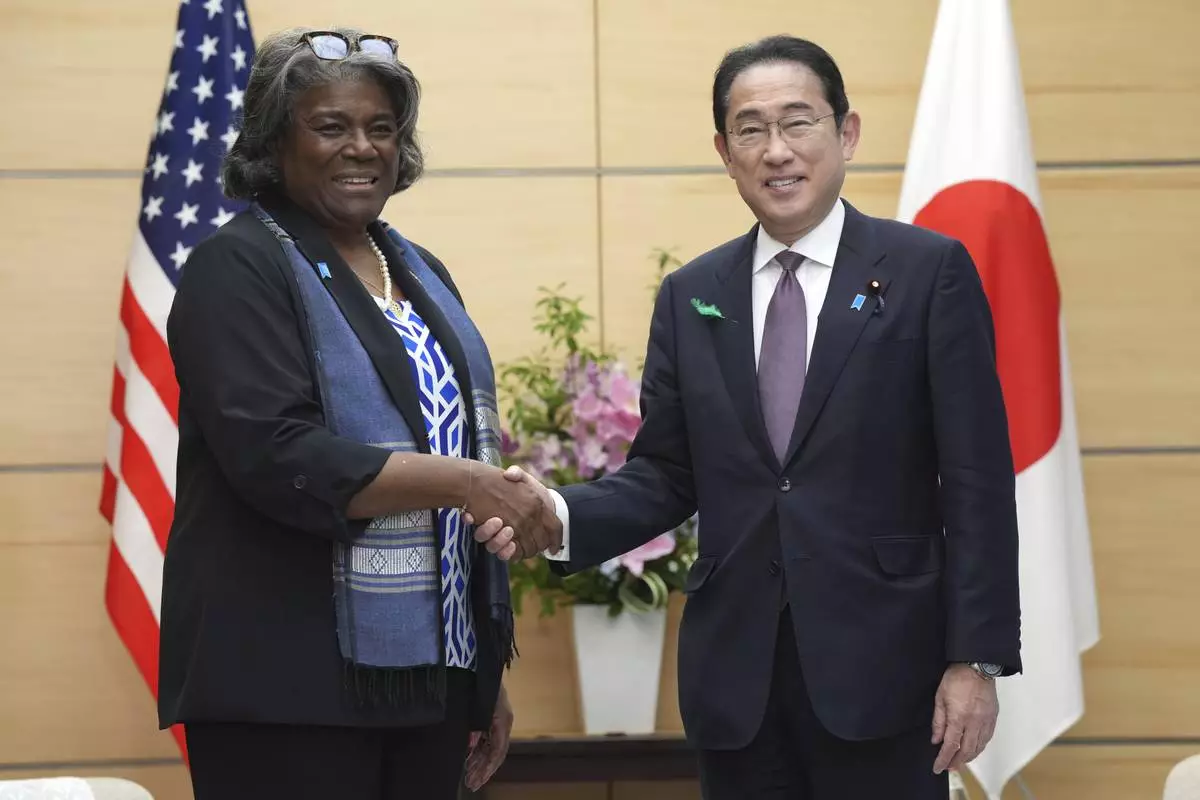
U.S. Ambassador to United Nations Linda Thomas-Greenfield, left, and Japan's Prime Minister Fumio Kishida, right, shake hands during a meeting Friday, April 19, 2024, at prime minister's office in Tokyo. (AP Photo/Eugene Hoshiko, Pool)
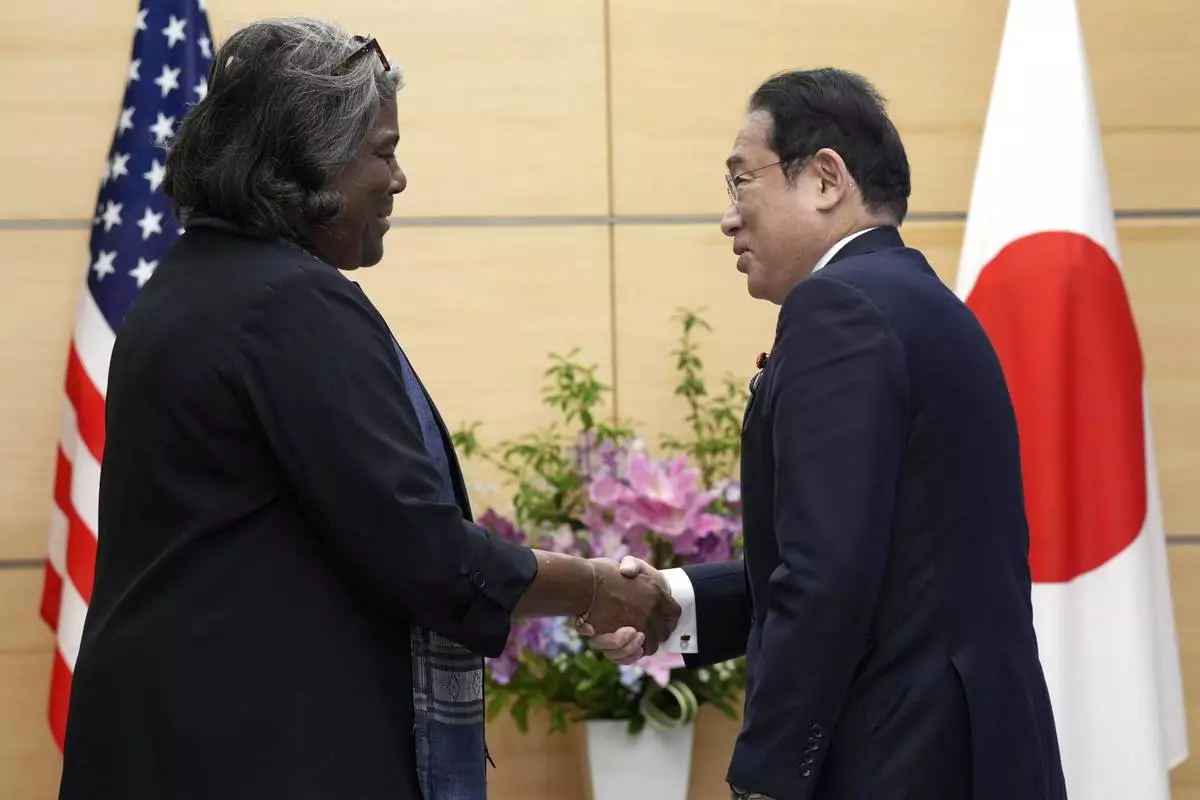
U.S. Ambassador to United Nations Linda Thomas-Greenfield, left, and Japan's Prime Minister Fumio Kishida, right, shake hands during a meeting Friday, April 19, 2024, at prime minister's office in Tokyo. (AP Photo/Eugene Hoshiko, Pool)
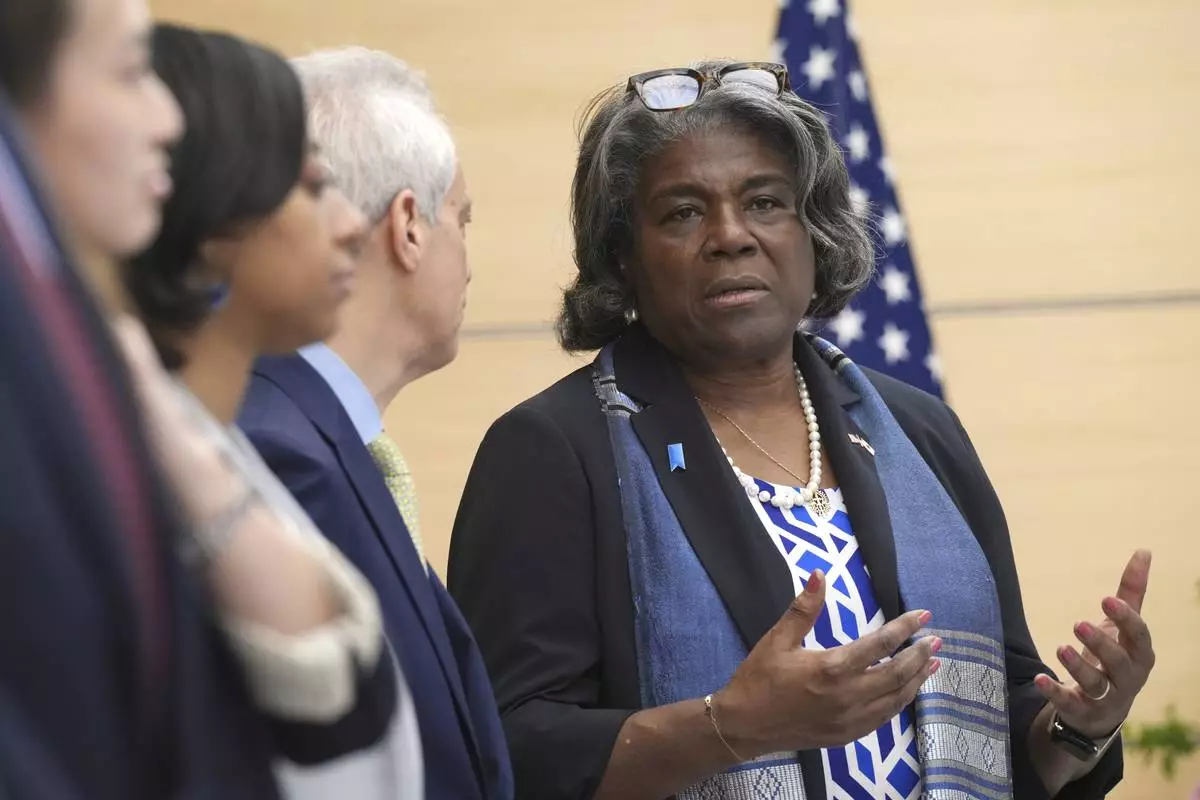
U.S. Ambassador to United Nations Linda Thomas-Greenfield, right, speaks to Rahm Emanuel, U.S. Ambassador to Japan, second right, as they wait for a meeting with Japan's Prime Minister Fumio Kishida Friday, April 19, 2024, at prime minister's office in Tokyo. (AP Photo/Eugene Hoshiko, Pool)
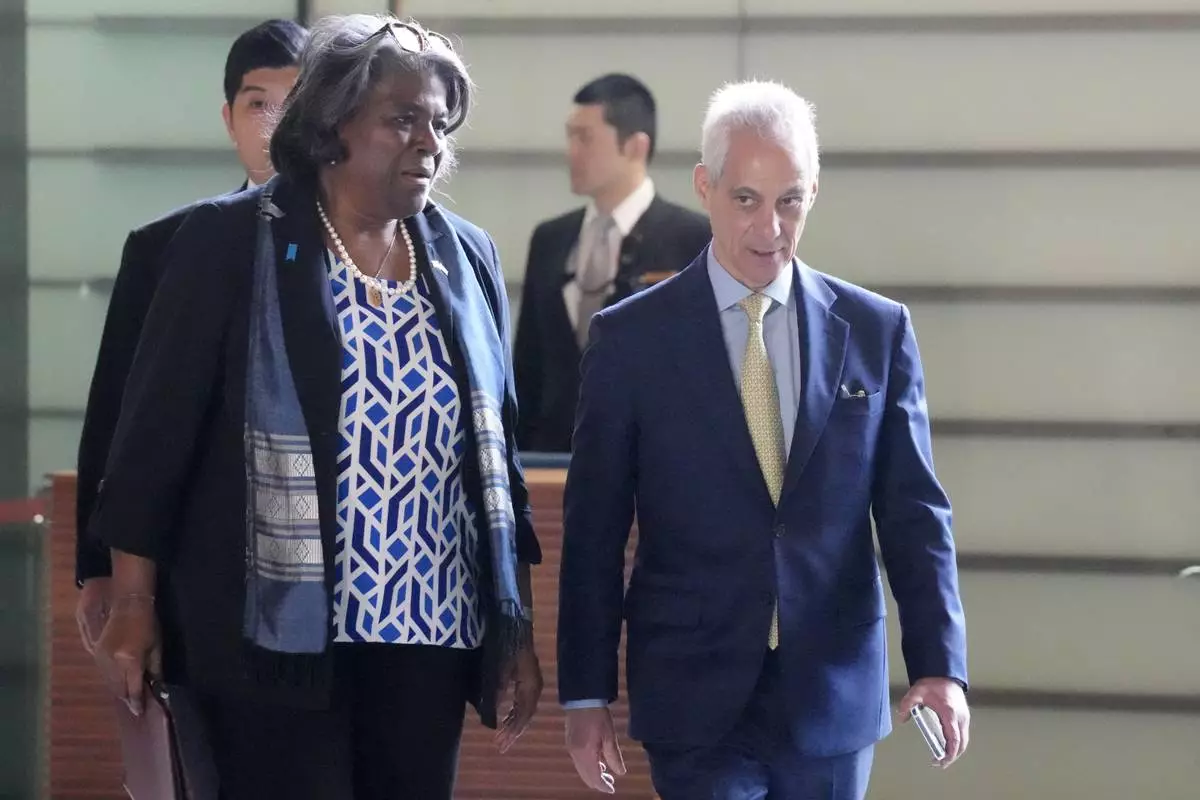
U.S. Ambassador to United Nations Linda Thomas-Greenfield, left, and Rahm Emanuel, U.S. Ambassador to Japan, right, walk to meet Japan's Prime Minister Fumio Kishida Friday, April 19, 2024, at prime minister's office in Tokyo. (AP Photo/Eugene Hoshiko, Pool)
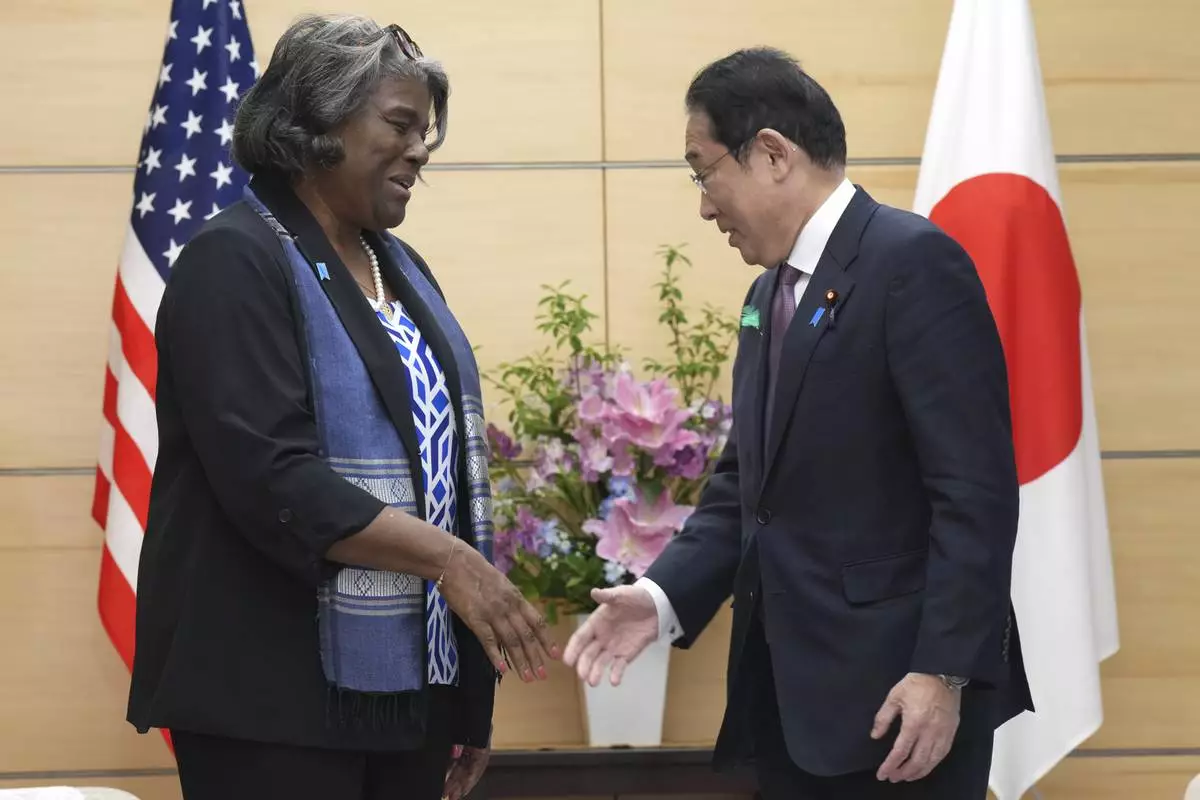
U.S. Ambassador to United Nations Linda Thomas-Greenfield, left, and Japan's Prime Minister Fumio Kishida, right, talk prior to a meeting Friday, April 19, 2024, at prime minister's office in Tokyo. (AP Photo/Eugene Hoshiko, Pool)
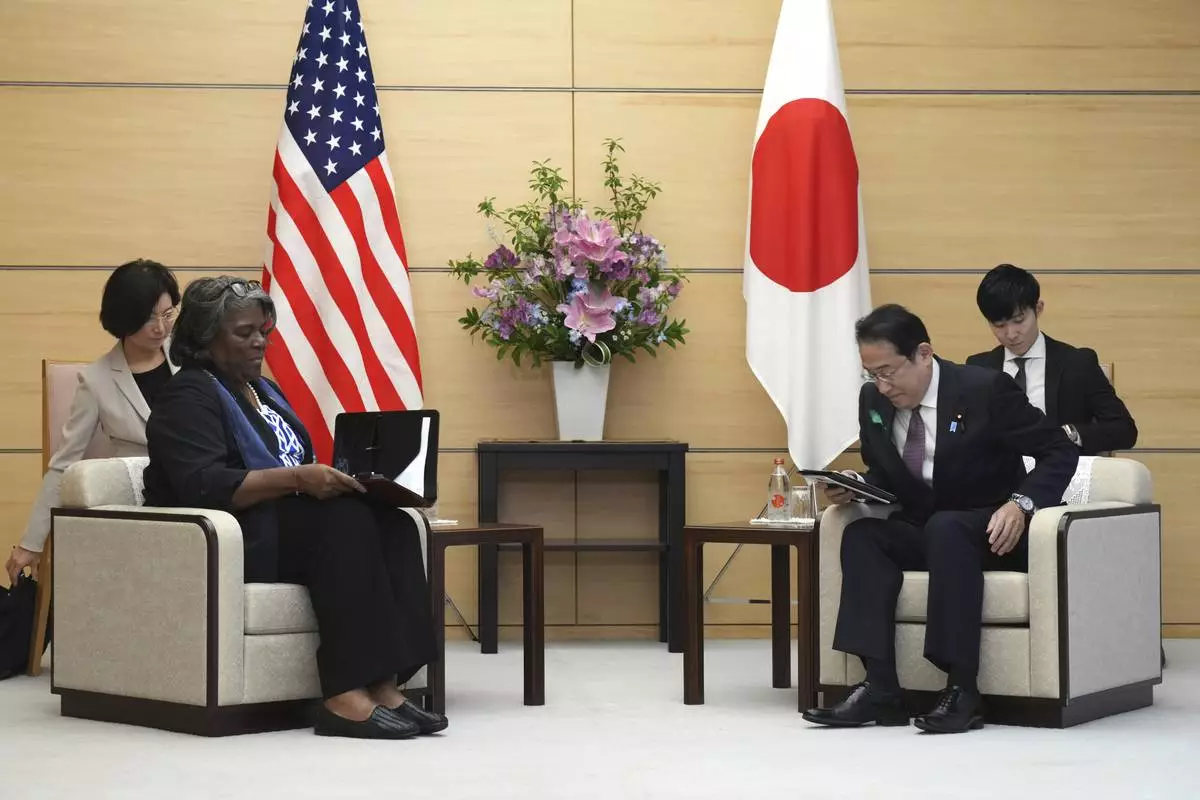
U.S. Ambassador to United Nations Linda Thomas-Greenfield, left, and Japan's Prime Minister Fumio Kishida, right, prepare to talk during a meeting Friday, April 19, 2024, at prime minister's office in Tokyo. (AP Photo/Eugene Hoshiko, Pool)















